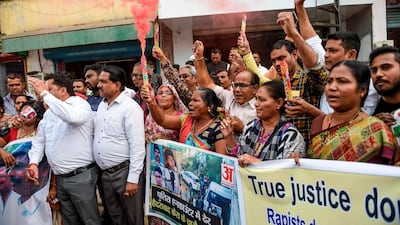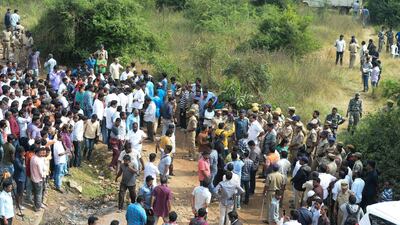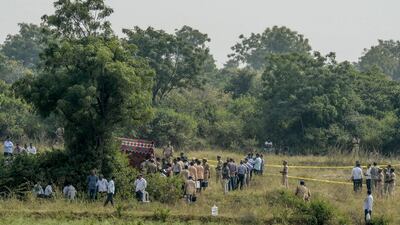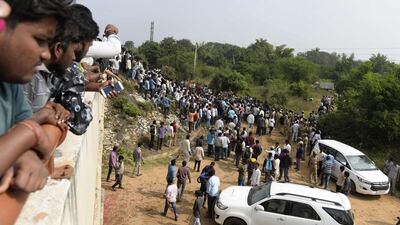The killing of four rape suspects by Indian police sparked wild street celebrations and praise from celebrities and politicians for delivering justice, but it has also raised questions about the possible bypassing of judicial process to pacify public anger.
Police said the suspects were fatally shot early on Friday while being taken to the scene of the crime for a re-enactment, after they tried to snatch weapons from officers and escape. The men were accused of the rape and murder of a 27-year-old veterinary doctor whose burnt body was found beneath a busy highway near the southern city of Hyderabad on November 27.
Local television showed jubilant crowds showering policemen with flowers and bursting firecrackers at the site of the shooting. The victim's father and sister thanked the police for the swift justice.
“My daughter’s soul will now rest in peace," the father told local television stations.
But the circumstances of suspects' deaths bear the hallmarks of extra-judicial killings widely known as “encounters”, in which police say the suspects were shot in self defence as they were trying to escape or resisting arrest.
Women's rights activists and lawyers who have fought for victims of rape and sexual violence called Friday's killings a tragedy and a distraction from the failings of the criminal justice system.
Kavita Krishnan, secretary of All India Progressive Women’s Association, demanded investigation.
“We must remember that these four men were suspects. We do not know if there was a shred of evidence proving their guilt, beyond the custodial confessions which police in India routinely obtain through torture.
“The police personnel responsible must be arrested and prosecuted, and must be asked to prove in court that all four men were killed in self defence,” Ms Krishnan said in a statement.
“A section of people is happy and it shows the system’s failure, but it is a tragedy. This is not the justice system we want," said Annie Raja, general secretary of the National Federation of Indian Women.
"In the name of women's safety and security, we do not want the country's law and order situation or judicial system to go into anarchy," Ms Raja told The National. "Some of the political parties and top leaders are encouraging the police and asking them to copy this model in other states."
On Saturday, the brother of another rape victim who was burnt to death called for his sister's attackers to be killed in an encounter.
The 23-year-old woman from Unnao in Uttar Pradesh state died in hospital on Friday, the day after she was waylaid and set on fire as she was travelling to a court for a hearing in the rape case she had filed against her former boyfriend. The woman had said that the man, who was recently released on bail, had threatened to kill her if she did not withdraw the case.
Five suspects have been arrested, including her alleged rapist, but the victim’s family are blaming the police and judges for releasing the man from custody and failing to ensure her safety.
Similar allegations cropped up in the Hyderabad case. The victim's family said the police initially refused to file a missing person complaint. The woman had told her sister by phone that she was stranded with her scooter by a highway and scared of some men who had approached to offer help, before the call was cut off.
Three policemen were suspended after they told the family that the area where the woman was stranded was not in their jurisdiction. They also suggested the woman might have “eloped with boyfriend” and asked the family if she was having any affairs.
The discovery of her charred body the next day triggered protests across India, where the prevalence of sexual assault and the response of the police and judicial system has been in focus since the fatal gang rape of a physiotherapy student aboard a moving bus in New Delhi in 2012.
That attack, now widely referred to as the "Nirbhaya case", prompted the introduction of fast-track courts for sexual crimes and harsher punishments, including the death penalty.
But sexual attacks remain rampant. According to the National Crime Records Bureau, 33,658 rapes were reported in 2017 but the conviction rate was only 32.2 per cent.
The public celebration of Friday's killings reflected the widespread frustration over the continued failure to prevent or swiftly punish sexual crimes. There have been calls from all corners for the guilty in the Hyderabad case to be given the death penalty, and one MP even suggested a lynching.
Activists believe the shootings were a direct outcome of such demands and warned that such action will not help to prevent crimes against women.
Supreme Court lawyer and human rights activist Vrinda Grover accused the Hyderabad police of using “public anger and anguish as an occasion to usurp power”.
"Strange kind of mob justice celebration is taking place in the country. Instead of investigation and prosecution, the state is committing murders to distract public and avoid accountability," Ms Grover told The National.
Ms Raja called for the policemen involved to be investigated and "an independent judicial inquiry into this 'encounter'."
Praising the killings could embolden police to act similarly in future cases, she said.
“When the political class claps and encourages, police will not hesitate to opt for such methods ... it will have a cascading and critical impact."














